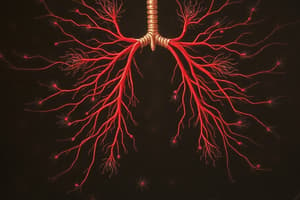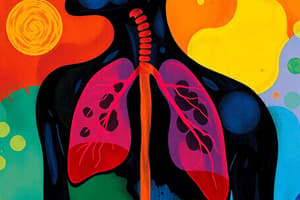Podcast
Questions and Answers
Flashcards
Food source of humans
Food source of humans
Humans obtain food from plants and animals.
Speed
Speed
Distance travelled per unit of time.
Preventing diseases
Preventing diseases
Improving sanitation and hygiene conditions helps prevent diseases like typhoid and polio, spread by the faecal-oral route.
Aluminum electrons
Aluminum electrons
Signup and view all the flashcards
Body message transmission
Body message transmission
Signup and view all the flashcards
Laws of motion
Laws of motion
Signup and view all the flashcards
Bundle of axons
Bundle of axons
Signup and view all the flashcards
Pairs of nerves
Pairs of nerves
Signup and view all the flashcards
Nerve impulses
Nerve impulses
Signup and view all the flashcards
Transverse waves
Transverse waves
Signup and view all the flashcards
Pure substance
Pure substance
Signup and view all the flashcards
Blood circulation system
Blood circulation system
Signup and view all the flashcards
Cellular respiration
Cellular respiration
Signup and view all the flashcards
Light travel
Light travel
Signup and view all the flashcards
Vascular bundle components
Vascular bundle components
Signup and view all the flashcards
Urinary waste removal tube
Urinary waste removal tube
Signup and view all the flashcards
Voluntary actions
Voluntary actions
Signup and view all the flashcards
Insulating materials
Insulating materials
Signup and view all the flashcards
Speed formula
Speed formula
Signup and view all the flashcards
Anemia effect
Anemia effect
Signup and view all the flashcards
Discoverer of gravity
Discoverer of gravity
Signup and view all the flashcards
Disease transmission
Disease transmission
Signup and view all the flashcards
Waste filter organ
Waste filter organ
Signup and view all the flashcards
Leaf main portion
Leaf main portion
Signup and view all the flashcards
Excretion
Excretion
Signup and view all the flashcards
Respiration type
Respiration type
Signup and view all the flashcards
Right Atrium blood
Right Atrium blood
Signup and view all the flashcards
Egg chromosome count
Egg chromosome count
Signup and view all the flashcards
Adult human brain weight
Adult human brain weight
Signup and view all the flashcards
Reabsorption nephron region
Reabsorption nephron region
Signup and view all the flashcards
Electron count for sulfur
Electron count for sulfur
Signup and view all the flashcards
Toothache cause
Toothache cause
Signup and view all the flashcards
Hand sanitizer use
Hand sanitizer use
Signup and view all the flashcards
Plant genetic modification goals
Plant genetic modification goals
Signup and view all the flashcards
Atom center
Atom center
Signup and view all the flashcards
Solution liquid component
Solution liquid component
Signup and view all the flashcards
Oxygen-rich blood reception
Oxygen-rich blood reception
Signup and view all the flashcards
Heat transfer by density difference
Heat transfer by density difference
Signup and view all the flashcards
Plant respiration
Plant respiration
Signup and view all the flashcards
Nucleus components
Nucleus components
Signup and view all the flashcards
Nephron function
Nephron function
Signup and view all the flashcards
Physical vs. chemical change
Physical vs. chemical change
Signup and view all the flashcards
Excretion organ
Excretion organ
Signup and view all the flashcards
Cranial nerves pairs
Cranial nerves pairs
Signup and view all the flashcards
DNA units
DNA units
Signup and view all the flashcards
Liquid blood component
Liquid blood component
Signup and view all the flashcards
Result of cell division
Result of cell division
Signup and view all the flashcards
Inherited traits
Inherited traits
Signup and view all the flashcards
Study Notes
Human Food Sources
- Humans obtain food from plants and animals.
- Food can be derived from both plants and animals, hence, both options a and b are correct.
Distance Traveled per Unit of Time
- The distance traveled per unit of time is called speed.
Number of Electrons in Aluminum
- Aluminum has 13 electrons.
Laws of Motion
- There are five laws of motion.
Pairs of Nerves in the Human Body
- There are 31 pairs of nerves in the human body.
Examples of Light Waves
- Light waves, radio waves, and X-rays are examples of transverse waves.
Body Systems (Blood Movement)
- The circulatory system moves blood throughout the body.
Cellular Respiration
- Cellular respiration needs glucose and oxygen to produce energy, releasing carbon dioxide and water as byproducts.
Light Travel in Air
- Light travels in a straight line in air.
Vascular Bundles in Plants
- Vascular bundles in plants are composed of xylem and phloem.
- Xylem and phloem are present with root hair cells.
Tube Arising from Kidneys
- The tube arising from each kidney and entering the urinary bladder is called the ureter.
Reading, Writing, etc
- Actions such as reading, writing, driving, and speaking are voluntary.
Calculating Speed
- Speed is calculated by dividing distance by time.
Gravity Discovery
- Isaac Newton discovered gravity.
Material That Traps Air
- Materials such as fur, wool, and sawdust trap air, and are good insulators.
Anemia
- Anemia is a condition where the body cells are deficient in oxygen.
- Anemia leads to tiredness and pale complexion.
Body Part Filtering Waste
- The kidneys filter nitrogenous waste from the blood.
Removal of Nitrogenous Waste
- The process of removing nitrogenous waste from the body is called excretion.
Right Atrium's Function
- The right atrium receives deoxygenated blood.
Brain Weight
- The average human brain weighs between 1500 and 1600 grams.
Oxygen Atoms
- Oxygen atoms contain 8 protons, 8 neutrons, and 8 electrons.
Toothache Cause
- A toothache is caused by a cavity in the tooth, where bacteria cause acid production that damages the enamel and nerves.
Use of Hand Sanitizer
- Hand sanitizer kills harmful germs, keeping the skin safe.
Genetic Modification Objectives
- Genetic modifications can improve plant qualities, such as making them disease-resistant, herbicide-resistant or increasing nutrient levels.
Dissolving Solids in Liquids
- When a solid dissolves in a liquid, the liquid is called a solvent.
Heat Transfer in Fluids
- Heat transfer caused by differences in density in fluids is called convection.
Atom Components
- The nucleus of an atom contains protons and neutrons.
Nephron Function
- The nephron is responsible for forming urine.
Substances Changing on Heating
- Substances that change shape or form when heated but recover their original state on cooling are undergoing physical changes.
Parts of Trachea
- The trachea consists of bronchi, bronchioles and alveoli(air sacs), where gas exchange occurs.
Best Way to Prevent Rusting
- Preventing metal rusting can be done effectively via galvanization.
Classifications of Humans
- Humans are categorized as heterotrophs.
Substance Exchange in the Body
- Exchanges of substances between blood and body cells take place in the capillaries.
Speed Calculation
- Speed is calculated by dividing the distance traveled by the time taken to travel that distance.
Direction of Motion in Forces
- Every action has an equal and opposite reaction that's acting in a parallel direction.
State Change Process
- Processes like evaporation, sublimation and condensation involve changes in the state of matter (solid, liquid, gas).
Sensory Neuron Direction
- Sensory neurons carry messages from sensory organs towards the brain.
Types of Immunity
- Innate, adaptive, and passive are three main types of immunity.
Blood Component
- Plasma is the liquid component of blood.
Cell Structure Controlling Cell Activity
- The nucleus is the part of the cell that controls the activities within the cell.
Parasite Food Source
- Parasites obtain food from a variety of sources, including plants, insects, animals, and other sources.
Important Constituent in Living Organisms
- Proteins are essential for all living organisms.
Organisms Making Their Own Food
- Organisms that can make their own food are called autotrophs.
Antibody Function
- Antibodies are proteins in blood that help fight against foreign viruses and bacteria.
Controlling Heartbeat and Blood Pressure
- The medulla oblongata controls involuntary functions such as heart rate and blood pressure.
Changes in Milk
- The transformation of milk into yogurt involves irreversible changes and is a chemical process.
Studying That Suits You
Use AI to generate personalized quizzes and flashcards to suit your learning preferences.




